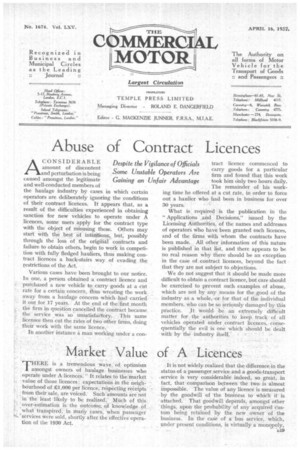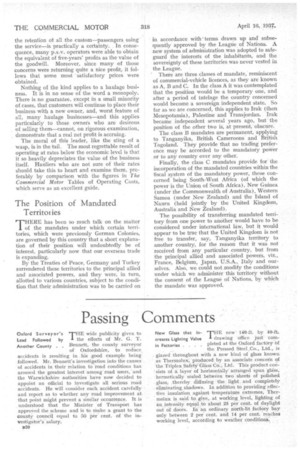Market Value of A Licences
Page 33

Page 34

If you've noticed an error in this article please click here to report it so we can fix it.
THERE is a tremendous wave of optimism• amongst owners of haulage businesses who operate under A licences. " It relates to the market value of those licences: expectations in the neighbourhood of £1, oco per licence, respecting receipts :from their sale, are voiced. Such amounts are not in the least likely to be realized. Much of this over-estimation is the outcome_ of knowledge of what transpired, in many cases, when passenger 'services were sold, shortly after the effective operation of the 1930 Act. It is not widely realized that the difference in the status of a passenger service and a goods-transport service is very considerable indeed, so great, in fact, that comparison between the two is almost impossible. The value of any licence is measured by the goodwill of the business to which it is • attached. That goodwill depends, amongst other things, upon the probability of any acquired custom being retained by the new owner of the business. In the case of a bus service, which, under present conditions, is virtually a monopoly, the retention of all the custom—passengers using the service—is practically a certainty. In consequence, many p.s.v. operators were able to obtain the equivalent of five-years' profits as the value of the goodwill. Moreover, since many of those concerns were returning quite a nice profit, it follows that some most ' satisfactory prices were obtained.
Nothing of the kind applies to a haulage business. It is in no sense of the word a monopoly. There is no guarantee, except in a small minority of cases, that customers will continue to place their business with a new owner, and, worst feature of all, many haulage businesses—and this applies particularly to those owners vvho are desirous of selling them—cannot, on rigorous examination, demonstrate that a real net profit is accruing.
The moral of this leader, like the sting of a wasp, is in the tail. The most regrettable result of operating at rates below the economic level is that it so heavily depreciates the value of the business itself. Hauliers who are not sure of their rates should take this to heart and examine them, preferably by comparison with the figures in The Commercial Motor Tables of Operating Costs, which serve as an excellent guide.
The Position of Mandated Territoi ies
THERE has been so much talk on the matter 1 of the mandates under which certain territories, which were previously German Colonies, are governed by this country that a short explanation of their position will undoubtedly be of interest, particularly now that our overseas trade is expanding.
By the Treaties of Peace, Germany and Turkey surrendered these territories to the principal allied and associated powers, and they were, in turn, allotted to various countries, subject to the condition that their administration was to be carried on in accordance with terms drawn up and subsequently approved by the League of Nations. A new system of administration was adopted to safeguard the interests of the inhabitants, and the sovereignty of these territories was never vested in the League.
• There are three classes of mandate, reminiscent of commercial-vehicle licences. as they are known as A, B and C. In the class A it was contemplated that the position would be a temporary one, and after a period of tutelage the country concerned would become a sovereign independent state. So far as we are concerned, this applies to Irak (then Mesopotamia), Palestine and Transjordan. Irak became independent several years ago, but the position of the other two is, at present, obscure.
The class B mandates are permanent, applying to Tanganyika, British Cameroons and British Togoland. They provide that no trading preference may be accorded to the mandatory power or to any country over any other.
Finally, the class C mandates provide for the incorporation of the mandated countries within the fiscal system of the mandatory power, those concerned being South-West Africa (of which the power is the Union of South Africa), New Guinea (under the Commonwealth of Australia). Western Samoa (under New Zealand) and the Island of Nauru (held jointly by the United Kingdom, Australia and New Zealand).
The possibility of transferring mandated territory from one power to another would have to be considered under international law, but it would appear to be true that the United Kingdom is not free to transfer, say, Tanganyika territory to another country, for the reason that it was not received from any particular country, but from the principal allied and associated powers, viz., France, Belgium, Japan, U.S.A., Italy and ourselves. Also we could not modify the conditions under which we administer this territory without the consent of the League of Nations, by which the mandate was approved.




























































































